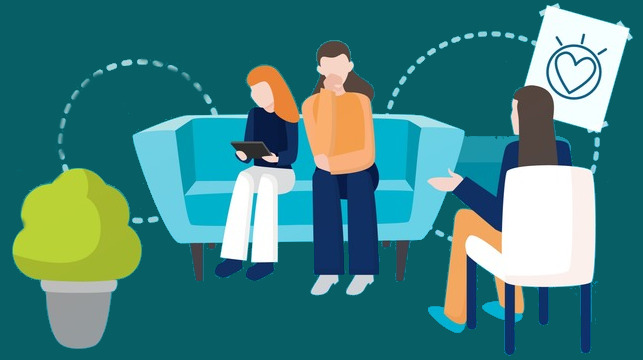How does mental health affect our daily lives? All aspects of our lives are affected by the way we feel. Our daily choices—big or small—are influenced by how we feel. And how we feel affects how we cope with life’s situations. For example, if we’re having a bad day, this may influence our interactions with others and even what we eat.
Mental health affects how we control stress, relate to others and make decisions. Mental health influences the way we look at ourselves, our lives and those around us. And like physical health, mental health is important at every stage of life. That’s why it’s critical to ensure that children receive the care they need to become healthy adults.
It’s normal to feel sad or stressed sometimes, but if you’re struggling with ongoing depression or anxiety, it might affect how you feel, think and handle daily activities like sleeping and eating. Left untreated, mental health issues can have a lasting impact on your life—but they don’t have to. Talk to your family doctor or another primary care provider as soon as possible if you notice symptoms of a mental health issue. Untreated depression, for example, may worsen over time and lead to substance abuse, anxiety disorders and suicidal thoughts and behaviors.
A lot of why we make unhealthy or poor decisions can be attributed to our mental health. When we’re in a down mood, we tend to let things get out of control, especially when it comes to eating. However, even small poor choices can eventually have a big impact on how we see ourselves and even how well we deal with others. It is important to take care of mental health to decrease stress and help us live healthier lives.It is about finding a balance in all aspects of life. Everyone has times when they feel down, stressed or frightened. This is normal and most people find these feelings pass over time. Mental illness – such as depression, anxiety or schizophrenia – are sometimes used as general terms for these feelings or conditions. But someone suffering from a mental illness feels it all the time and cannot easily cope or recover without help.
What exactly is a Mental Illness?
There is a lot of misinformation out there about mental illness, and it’s important to know the facts. For example, common mental illnesses include depression and anxiety, but you can’t catch them from someone else. Instead, these diseases affect people who experience a combination of multiple genetic, biological and environmental factors, including experiencing trauma or social stressors such as bullying and other violence. And despite how the scientific community understands mental illnesses, they are still often stigmatized.
It’s important to understand what mental illness is and isn’t. Mental illness is a physical illness of the brain that causes mild to severe disturbances in thinking, behavior, or emotions. That means that these illnesses aren’t just problems people bring on themselves. They’re real medical conditions that can have real medical treatments.
Mental health conditions affect people of all ages, races, ethnicities and economic backgrounds. They are often experienced as a set of symptoms that can include changes in thinking, feeling or behaving. Some common mental health conditions—including anxiety disorders and mood disorders—can run in families while others.
Anxiety disorders
Anxiety disorders are a group of mental illnesses. They happen when a person regularly feels excessively worried or frightened, even though there is no reason to or the worry cannot easily be controlled. Feelings of anxiety often occur for no apparent reason and can be triggered by certain thoughts, situations or objects. Anxiety disorders can occur at any age and may affect both men and women.
Mood disorders
Mood disorders are a category of illnesses that describe a serious change in mood. Illness under mood disorders include depression, bipolar disorders, anxiety disorders, personality disorders and schizophrenia.
Mood disorders such as depression or bipolar disorder are mental disorders that affect people differently, but all can cause feelings of hopelessness and a lack of interest in activities you once enjoyed. People who have these illnesses may have problems handling everyday problems, feel unusually sad and lose interest in work, family and other activities they once enjoy.
Mental Health Awareness
Mental health is a level of psychological well-being or an absence of mental illness. For many adults who have mental disorders, symptoms were present but often not recognizable or obvious during childhood and adolescence.Many factors contribute to mental health problems, including biological factors (such as genes or brain chemistry), life experiences (such as trauma or abuse) and family history of mental health problems.
Being aware of our mental health and understanding how important it is can positively impact our lives. Paying attention to the signs and symptoms of mental illness is an essential part of improving mental health and wellbeing. This means being able to recognize when we are not functioning as well as we could be and taking action to get the help we might need.
What You Can Do to Help?
Misinformation and stigma around mental health can feel like overwhelming obstacles for someone who is struggling with a mental health condition and their loved ones. Here are a few simple ways that you can help create a world in which everyone with a mental illness is treated with respect, understanding, and empathy.
- Educate yourself about mental health conditions and reduce your own stigma around them.
- Be open about any struggles you might have so that others feel comfortable talking about their own issues.
- Take care of your own mental health and wellbeing.
- Speak up against stereotypes, stigma, and prejudice against those living with mental illness by challenging discrimination when you hear jokes or see media that degrade people with these illnesses.
- Let someone know who you think might be struggling with a mental health condition that you are there for them and encourage them to find help from a professional.
If you are living with a mental health condition, help is available. Talk to someone you trust and make an appointment with your doctor. There are support groups in many communities, but if travelling to one is difficult, there are also online support networks available. It’s normal to feel embarrassed or ashamed about a mental illness, but treatment can help you get better.








